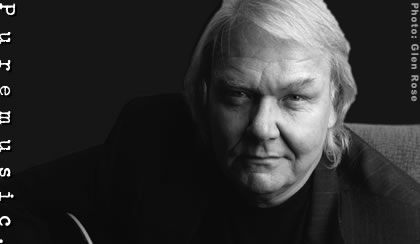
A Conversation with Al Anderson
Puremusic: So I was listening to the last several records. I enjoyed the hell out of them, too.
Al Anderson: Thanks a lot.
PM: In the song "Without Your Love," which you wrote with Craig Wiseman, are those your roots you're talking about, your personal roots?
AA: No. It's just a song.
PM: Just a story, right?
AA: Yeah.
PM: So how would you characterize your roots, your growing up? What was the situation?
AA: We weren't rich, that's for sure. My dad died when I was ten. My mom was a piano teacher. Dad was a bass player.
PM: What did he die of when you were so young?
AA: Alcoholism.
PM: Cirrhosis?
AA: I don't know. But they found him dead in Arizona somewhere.
PM: Yeah. My grandfather died of alcoholic dementia at 38.
AA: My uncle did, too. He died of dementia from alcohol, but he was clean for ten years, and he went around to corporations to talk with people who were having trouble about--alcoholics.
PM: And then he died of alcoholic dementia?
AA: Yeah. He had ten good years, then he started losing it.
PM: Oh, my God! I've never heard of that. It's like the Hep C of his day comes and catches your ass ten, fifteen years after the fact?
AA: Later on, yeah. Yeah, I'm paying now for shit I did before.
PM: Oh, yeah.
[laughter]
AA: In fact, I'm 14 years clean and sober today.
PM: Yeah, I'm a friend of Bill's [a phrase that means you're in AA--denoting a friend of Bill Wilson's, one of the founders], somewhere between eight years and nine. Fourteen years today. And so you don't care if I say so, right?
AA: No.
PM: So how many kids were in the family?
AA: I had a sister from my mom's first husband. And she passed away. She was fifteen years older than me, and was married by the time I was three. Her husband was a guitar player, and that's how I kind of fell in love with the guitar.
PM: He infected you with the bug for guitar early.
AA: Country music and the Everly Brothers--back then country music and rock 'n' roll were the same thing.
PM: And so you grew up with just your mom. She was teaching piano and eking out a living.
AA: Yeah.
PM: And you were living in--
AA: Windsor, Connecticut.
PM: Now, that was a well-to-do town, or had all kinds of neighborhoods, or--
AA: No, just your normal town, a suburb of Hartford.
PM: And schooling was--
AA: I hated it. God, I hated school.
PM: Yeah. Most of the great guitar players I know didn't have much truck with school.
AA: They had a prep school there where most of my family went. And I went there to summer school for six weeks, and I took English and vocabulary. I learned more in that six weeks than I ever learned in my six years at Windsor High School.
[laughter]
PM: Unbelievable.
AA: That junior year was the worst three years of my life.
PM: [laughs] It's amazing you could go somewhere for six weeks and learn so much.
AA: Yeah, they make you want to learn.
PM: Yeah.
AA: Not on purpose, it's just that there was only about ten people in there.
PM: So it wasn't just a love of music, a love for words began early as well?
AA: Not really. No, it didn't have anything to do with lyrics. I'm much heavier on music than I am on lyrics.
PM: To this day.
AA: To this day.
PM: Yeah. That's one of the reasons you write so well and so often with Craig Wiseman, for instance, because I understand the man is just like--
AA: Oh, yeah, he's the guy.
PM: You just turn him on, and words start coming out of his mouth, and they just don't stop.
AA: Sometimes it takes all day, but when it's done, you got a masterpiece, usually. And then the antithesis of that is Dean Dillon, who can write just as poignant and just as scary in first-grade English, and by the time he gets done with a verse, there's nothing left to say.
PM: Wow. And it's not because he sat there throwing words at you, and some stuck.
AA: No. He's just talking to give you a little conversation--he's more scary to me than anybody.
PM: Dean Dillon. Wow.
AA: I mean, that's the real deal. You don't have to go to school to write like that guy.
PM: Yeah, you just have to live.
AA: Yeah.
PM: And it's more than that, but that's where it comes from. Yeah. Does he make his own records?
AA: No, not in a long time. He was on RCA years ago. But the both of them, as far as males go, they're the best going.
PM: Wow. I'm going to look harder into Dillon's work, because I don't know his work well enough.
AA: "Set 'Em Up, Joe."
PM: Oh, wow.
AA: "Tennessee Whiskey," "A Lot of Things Different," "The Chair." 48 George Strait cuts.
PM: Really?
AA: And ten on the Greatest Hits, in the box set.
PM: [laughs] Hello. Oh, my. continue
print (pdf) listen to clips puremusic home